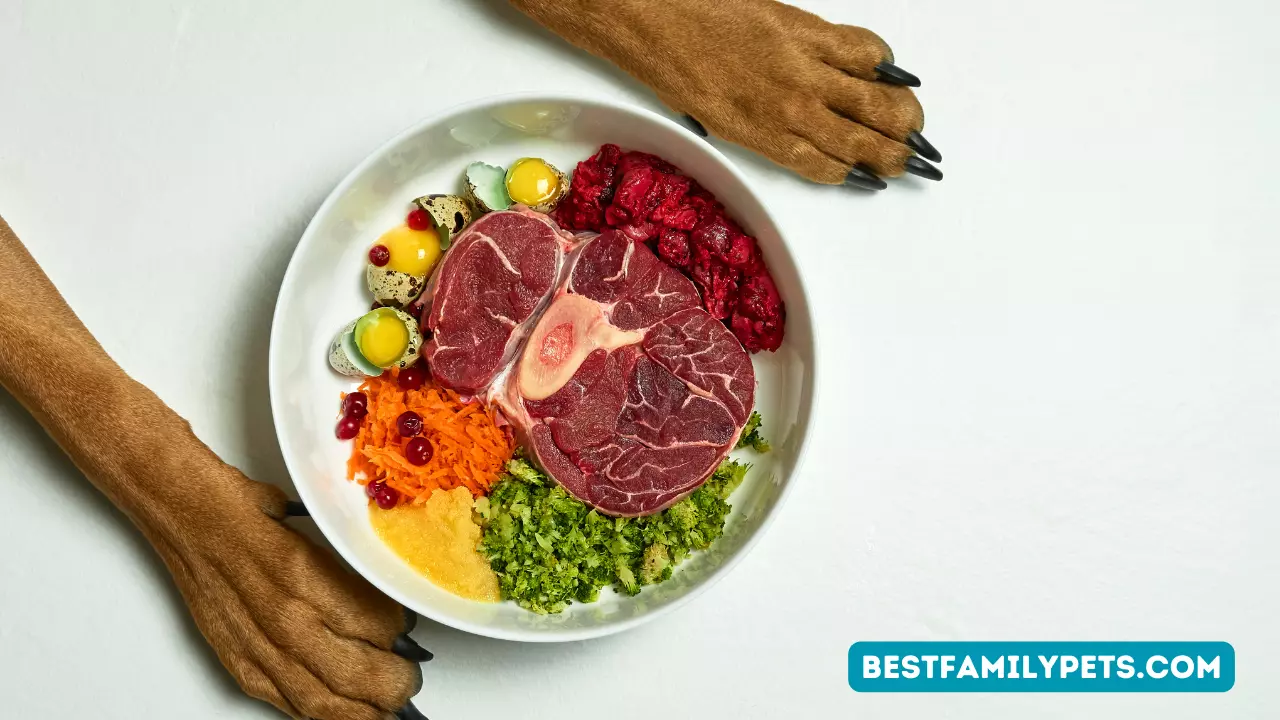Organ Meat to Dogs: Benefits and Precautions
Nourish your furry friend with organ meat. Unleash the benefits and ensure precautions for their optimal health!
Thinking of adding some extra oomph to your furry friend’s diet? Look no further than organ meats! Packed with essential nutrients, these delicacies can be a valuable addition to your dog’s meal plan. But before diving headfirst into the offal, let’s explore the ins and outs of feeding Organ meat to your canine companion.
A Treasure Trove of Nutrients:
Organ meats are nature’s multivitamins for dogs. Think protein, iron, zinc, vitamins A, C, and E – the list goes on! Livers, hearts, gizzards (chicken, duck, turkey), and even organs from larger animals like cattle and sheep can be a nutritional goldmine.
Moderation is Key:
While organ meats are powerhouses of goodness, remember: treat, not meal! Dr. Jessica Taylor, veterinary expert at Petfolk, advises using them as a food enhancer, sprinkled on kibble or mixed into meals. Overdoing it can lead to weight gain and other health concerns.
Choking Hazards Be Aware:
Chicken gizzards, those tough muscles from the bird’s digestive system, pose a choking risk. Always chop any hard-to-digest organ meats into bite-sized pieces before serving.
Raw vs. Cooked: Safety First:
Dr. Taylor emphasizes the dangers of raw organ meats due to potential bacterial contamination. Both dogs and humans can get sick, even fatally. While cooking might reduce some nutrients, it’s the safer option.
Finding the Perfect Portion:
The ideal amount of organ meat depends on your dog’s size, health, and overall diet. Consult your veterinarian to determine the appropriate portion size and ensure their nutritional needs are met.
Remember: Organ meats are not a complete diet. They should complement a balanced, commercially-prepared food to guarantee your dog gets all the essential nutrients for a healthy, happy life.
Bonus Tip: Explore different organ meats to see what your dog enjoys. Start small and monitor their reaction. With proper guidance and moderation, organ meats can be a delicious and nutritious addition to your dog’s diet!
nutritious dog treats,canine organ meat,healthy dog food additives,benefits of organ meat,high-protein dog treats,nutrient-rich dog snacks,essential vitamins for dogs,feeding dogs organ meat,balanced dog diet,veterinarian-approved treats
Nutritional Benefits of Organ Meat for Dogs

A Nutritional Powerhouse for Canine Companions
Forget boring kibble, your furry friend deserves the best! Organ meats, nature’s multivitamin for dogs, offer a wealth of benefits beyond traditional muscle meat. Packed with protein, vitamins, and minerals, these nutrient-dense delights can be a game-changer for your dog’s health and well-being.
A Symphony of Essential Nutrients:
From the liver and heart of cattle and sheep to the gizzards of chicken, duck, and turkey, organ meats are an orchestra of goodness. They provide a variety of essential nutrients, including:
- Protein: Builds and repairs muscle, essential for an active lifestyle.
- Iron: Supports oxygen transport, crucial for energy levels and overall health.
- Zinc: Boosts the immune system and keeps skin and coat healthy.
- Vitamins A, C & E: Powerful antioxidants that support a strong immune system and fight off disease.
Fueling Your Dog’s Active Life:
Is your pup a canine athlete participating in dog sports or enjoying regular adventures? Organ meats come to the rescue! The abundant vitamins and minerals support a robust immune system to fight off infections, while the high protein content aids in muscle growth and repair, keeping your furry friend at peak performance.
Moderation is Key:
Remember, organ meats are not a complete meal but a delicious and nutritious supplement to a healthy and tasty diet. Overindulging can lead to weight gain and other health concerns. Consult your veterinarian to determine the appropriate portion size for your dog’s needs.
Safety First: Choking Hazards and Raw Meat:
Tougher organ meats like chicken gizzards can pose a choking hazard. Chop them into bite-sized pieces before serving. Additionally, avoid raw organ meat due to potential bacterial contamination. Thoroughly cooked organ meat offers a safer option while still preserving valuable nutrients.
Finding the Perfect Portion:
Every dog is unique! Their size, health, and nutritional needs determine the ideal amount of organ meat. Consult your veterinarian to create a personalized plan that ensures your dog receives the right balance of nutrients and enjoys this delicious treat safely.
Embracing the Power of Organ Meat:
Organ meats are a nutritional powerhouse for dogs, offering an array of benefits for their overall health and well-being. Remember to practice moderation, prioritize safety through proper preparation, and consult your veterinarian for guidance. By embracing the power of organ meats, you can take an active role in providing your beloved pet with a balanced and fulfilling diet that keeps them happy and healthy for years to come!
Consulting Your Veterinarian: Expert Advice on Feeding Organ Meat to Dogs
Thinking of adding organ meats to your furry friend’s menu? Hold on! Before diving into this nutritional adventure, consulting your veterinarian is a crucial step. Their expert advice can ensure your dog enjoys the benefits of organ meat safely and effectively.
Why Consult Your Vet?
Veterinarians are your dog’s dietary gurus. They possess deep knowledge about canine nutritional needs and can offer invaluable insights on incorporating organ meats into your pet’s diet. With their guidance, you can maximize the benefits while minimizing potential risks.
Tailored Advice for Your Unique Pup
Every dog is unique, and so are their dietary needs. Your veterinarian can tailor their advice to your dog’s specific size, health status, and individual requirements. They can help you determine:
- Safe and appropriate serving sizes: Avoid overdoing it! The vet will help you find the sweet spot to optimize nutrition without compromising health.
- Feeding frequency: How often should you offer organ meats? Your vet can create a personalized schedule that fits your dog’s needs.
- Special safety considerations: Are there any underlying health conditions or sensitivities to be aware of? Your vet will guide you on safe preparation and feeding practices.
Unlocking the Benefits, Responsibly
With your veterinarian’s guidance, you can confidently incorporate organ meats as a valuable supplement to your dog’s diet, enriching their nutrition without jeopardizing their well-being. Remember, their expertise is your dog’s safeguard. Embrace their knowledge and collaboration for a happy and healthy pup!
Remember:
- This post is for informational purposes only and shouldn’t replace your vet’s professional advice.
- Always consult your veterinarian before making any changes to your dog’s diet.
organ meat for dogs,dog food with organ meat,benefits of organ meat for dogs,nutritious organ meat treats,adding organ meat to dog’s diet,high-quality organ meat for dogs,health benefits of feeding organ meat to dogs,best organ meat options for dogs,incorporating organ meat into dog’s meals,balanced dog nutrition with organ meat
FAQs:
1. What is organ meat, and why is it beneficial for dogs?
Organ meat refers to the internal organs of animals, such as liver, kidney, heart, and lungs. Organ meat is highly nutritious for dogs as it is packed with essential vitamins, minerals, and proteins. It is particularly rich in nutrients like vitamin A, B vitamins, iron, and zinc, which can support overall canine health.
2. How can organ meat benefit dogs?
Organ meat offers several benefits to dogs. It provides a natural source of essential nutrients that can contribute to healthy skin and coat, improved digestion, enhanced immune function, and better energy levels. The nutrients found in organ meat can also support the development and maintenance of healthy muscles and tissues in dogs.
3. How much organ meat should I feed my dog?
The amount of organ meat to feed your dog depends on factors such as their size, age, and overall health. It’s recommended to consult with your veterinarian to determine the appropriate serving size for your specific dog. As a general guideline, organ meat should make up about 10% of your dog’s balanced diet.
4. Are there any precautions to take when feeding organ meat to dogs?
While organ meat can be highly beneficial, it’s important to take certain precautions. Avoid feeding excessive amounts of organ meat, as it can lead to digestive upset or imbalances. Additionally, ensure that the organ meat is sourced from reputable and trusted sources to reduce the risk of contamination or harmful substances.
5. Can all dogs tolerate organ meat in their diet?
Most dogs can tolerate organ meat in their diet without any issues. However, some dogs with specific health conditions or dietary sensitivities may require special consideration. If your dog has any underlying health concerns or dietary restrictions, it’s advisable to consult with your veterinarian before incorporating organ meat into their diet.
Conclusion
In conclusion, organ meat can provide your dog with a healthy treat. It is nutrient-rich, making it especially advantageous for energetic dogs who participate in sports or frequent activity. But moderation is the key, and it’s crucial to speak with your vet to figure out how much organ meat your dog actually needs. These recommendations will help you provide your dog with a tasty and healthy complement to their food while also maintaining their general wellbeing.
You may also like these:
-

Feed the Beast Right: Why Pet Nutrition Isn’t Just Kibble and Luck
-



Finding the Best Dog Food Deals with Delicutu
-



Homemade Dog Food for Shih Tzus With Skin Allergies
-



The Role of Veterinarians in Raw Dog Food Safety
-



Puppy Palooza: Role of Gut-Loving Frozen Treats for Happy, Healthy Dogs
-



Raw Dog Food Safety: How to Ensure Your Pet’s Raw Diet Is Balanced and Healthy
-



The 12 Best Dog Bowls of 2024 for Dachshunds: How to Choose the Right One
-



Review: PetSafe Simply Feed Automatic Feeder
-



Review: JW Pet Skid Stop Slow Feed Bowl
-



Review: Dogit Slow Feeder Dog Bowl
-



Review: Outward Hound Fun Feeder Slo Bowl
-



Review: NMN Products Raised Dog Bowls
-



Review: Pet Zone Adjustable Elevated Pet Feeder
-



Review: FOREYY Raised Pet Bowls for Small and Medium Dogs
-



Can Dogs Drink Almond Milk?



